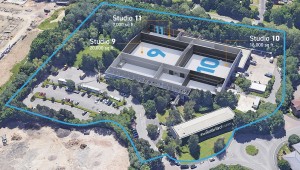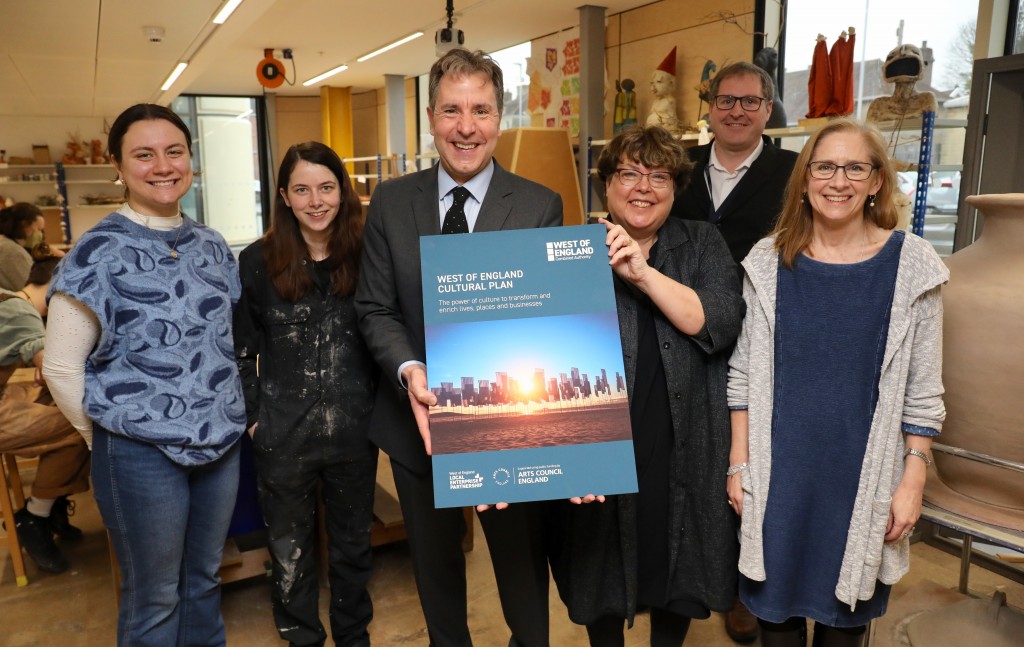A new ‘cultural plan’ to boost a sector that contributes just under £2bn a year to the West of England’s economy by putting it on the map for national and international success has been unveiled.
The prospectus showcases the region’s creative individuals – including its world-beating artists and games designers – highlights its top visitor attractions and throws a spotlight on the reasons why it is go-to place for investment in the creative industries, including film and TV production. 
It was officially unveiled this week by West of England Metro Mayor Dan Norris on a visit to Bath Spa University’s School of Art, Film and Media and Bath School of Design.
It will be supported by members of the West of England Cultural Compact – the only body of its kind in the UK with a regional remit.
Mayor Norris, who leads the West of England Combined Authority (WECA), said by pulling together players from across the region it had a “tremendously strong offer” in the creative sector.
The plan will be used to promote the region and, for the first time, ensure that all its creative talent – from its filmmakers and tourist attractions to its universities, cafes and councils – are “singing from the same hymn sheet”.
The mayor said people in the creative industries had been hit hard by the pandemic, with workers in the hospitality, tourism, retail and creative sectors disproportionately losing incomes and jobs in lockdowns.
Many of these were freelancers, excluded from much government support.
There would now be a relentless focus on the future, he said, adding: “In the coming years I am determined we do much more than just survive, but to go on and really thrive – to build back even better and progress far further. 
“I want to ensure more local people than ever before have the opportunities to achieve their full potential and make sure as many people as possible know about the amazing things we do here.
“Above all, I want to put our truly great region even more firmly on the map for national and international success.”
He said he was proud that the region was attracting international investment from the key international players, including the 500-plus businesses that have been boosted directly from investment by Netflix, which in turn had created 1,000 jobs across the UK.
Meanwhile, around 800m people a month watch digital content produced in Bath and Bristol.
WECA’s £12m investment in Bristol’s Bottle Yard Studios complex, pictured above, sent a “strong, confident and really important message to the world” that the region’s creative sector was thriving and growing, he added.
“I am also supporting small businesses and freelancers with a programme of professional development and paid placements for young people,” the mayor said.
“We are making amazing TV such as The Outlaws, (pictured), Tracey Beaker and the wonderful David Attenborough series. We need everyone to know they are made in the West. 
“Those who know the West of England love it, its super creativity, and its can-do attitude to take action and achieve results.
“This Cultural Plan will ensure even more people fall under the West of England's spell to build on our already outstanding national and global success.”
West of England Cultural Compact chair Prof Sue Rigby, who is also vice-chancellor of Bath Spa University, said the Cultural Compact was about helping people in the region enjoy better lives, better lived.
“It places culture and creativity front and centre of our jobs, skills, wellbeing and investment agenda,” she added.
“Our unique regional design makes us a trailblazer for national policy and an international beacon for this vital work.”
Arts Council England South West area director Phil Gibby, pictured, described the launch of the plan as “a truly significant moment for the strategic development of arts and culture in the West of England”.
“Arts Council England highly values its working relationship with WECA and welcomes both the publication of the new West of England cultural plan and, under the leadership of Prof Sue Rigby, the formal launch of the Cultural Compact,” he said. 
“We welcome, in particular, the strong focus on culture at the heart of placemaking, so that the whole of the West of England benefits from these ambitions.
“The opportunities for talent development and the freelance creative workforce that the plan brings are also immensely valuable.
“And, of course, we recognise and applaud the substantial financial commitment that the combined authority is making in support of this agenda.
“Where they lead, other funders and investors are sure to follow. Arts Council England looks forward to partnering closely on many of these projects. We consider ourselves to be proud partners of the West of England Combined Authority in advancing the ambitions that have been outlined today.”
The Cultural Compact is one of 20 established with funding from Arts Council England to Cultural Compacts to support the local cultural sector. It is the only cultural compact with a regional remit, embracing the diversity of our culture and creativity, our residents and businesses, our cities and communities.
The Outlaws photo, courtesy of The BBC, Amazon, Big Talk, Four Eyes
Pictured at the cultural plan launch, from left: Bath Spa University students Megan Churchill and Helen Rogers; Metro Mayor Dan Norris; Prof Sue Rigby; head of Bath School of Art, Film and Media Dan Allen; and Kristin Doern, Head of Bath School of Design



















